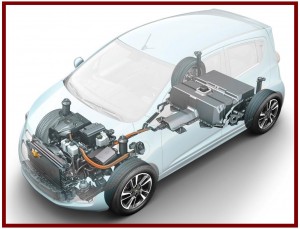
Spark will be the first pure electric vehicle from GM since the ill-fated EV1 when California was mandating that EVs make up 10% of the U.S.’s largest car market.
A123 Systems (Nasdaq: AONE), a developer and manufacturer of lithium iron batteries and systems, today filed for Chapter 11 bankruptcy protection in the U.S. Bankruptcy Court for the District of Delaware. A123 ran out cash as demand for its electric vehicle batteries and its EV control systems remains weak to almost non-existent. As part of a proposed reorganization Johnson Controls (NYSE: JCI) will supply $72.5 million in “debtor in possession” financing to continue A123’s operations as JCI purchases parts of A123.
The announcement follows a $55 million recall that started in March for A123 lithium ion batteries after the well-publicized failure during testing of a Fisker Karma that was owned by Consumer Reports. A123, an investor in Fisker, lost almost $260 million in 2011. During Q1 of 2012, total operating loss was $130 million, the latest financial results available.
Under an agreement with JCI, A123’s automotive business assets will go to JCI for $125 million. This includes all of its automotive technology, products and customer contracts; its facilities in Livonia, which are only partially finished, and Romulus, Michigan; its cathode powder manufacturing facilities in China, and A123’s equity interest in Shanghai Advanced Traction Battery Systems Company, A123’s joint venture with Shanghai Automotive.
“We believe the asset purchase agreement with Johnson Controls, coupled with a Chapter 11 filing, is in the best interests of A123 and its stakeholders at this time,” said David Vieau, Chief Executive Officer of A123. “We determined not to move forward with the previously announced Wanxiang agreement as a result of unanticipated and significant challenges to its completion.
In August, A123 signed a memorandum of understanding with Wanxiang Group Corporation, China’s largest automotive components manufacturer. Under the terms of the agreements, Wanxiang planned to invest up to $465 million in A123.
A Fisker spokesperson told AutoInformed: “Fisker welcomes the prospect of JCI, a recognized and strong Tier One supplier with which we already have a relationship, acquiring A123’s automotive operations in order to continue production of the battery pack that we currently use on the Karma to supplement our existing inventory, which is expected to cover our needs through at least the first quarter 2013.”
The asset purchase agreement also includes provisions where Johnson Controls intends to license back to A123 some technology for its grid, commercial and government businesses. A123 said in a statement that it also “continues to engage in active discussions regarding strategic alternatives for its grid, commercial, government and other operations, and has received several indications of interest for these businesses.”
A123, of course, is part of a contentious campaign debate about Democratic subsidies to advanced technology companies, including solar panel maker Solyndra whose bankruptcy cost taxpayers half a billion dollars. What is clear is that President Obama’s forecast of 1 million EVs on the road by 2015 is wrong. Thus far, sales of EVs calculated in only thousands of units in the U.S. have been disappointing to boosters of the advanced, clean running but expensive vehicles.
A123 received a $249.1 million grant from the Department of Energy to reopen old auto plants in Livonia and Romulus, Mich., as well as money and tax credits from Michigan worth more than $100 million. It remains part of a contentious campaign debate about Democratic subsidies to advanced technology companies, including solar panel maker Solyndra whose bankruptcy cost taxpayers half a billion dollars. What is now clear is that President Obama’s forecast of 1 million EVs on the road by 2015 is wrong. Thus far, sales of EVs in the U.S. have been disappointing to boosters of the advanced, clean running vehicles.
A123 Systems was scheduled to supply lithium-ion battery packs that will power the upcoming Chevrolet Spark EV when it entered production in 2013. A123 uses nanophosphate as a positive electrode material that is claimed to have higher usable energy than other lithium ion technologies. This – in theory – enables greater battery use. A GM spokesperson said the company was monitoring the situation, but “we expect no impact to the Spark EV program.”
A revised battery chemistry was also supposed to become available to automakers for testing later this year. A123 claimed it would significantly “reduce or eliminate the need for heating or cooling systems.” Testing is one thing, production contracts are quite another hurdle, one that JCI is apparently willing to jump with its deep pockets. JCI had $41 billion in sales during 2011.
See:
- Fisker Appoints New CEO – Tony Posawatz from GM’s Volt Program
- Fisker and Leonardo DiCaprio to Work on ‘Sustainability’
- Taxpayer Funded A123 Systems Claims Breakthrough Battery
- A123 Recalls Lithium Ion Batteries Shipped to Fisker, Others
- Fisker Expands Karma Battery Recall for Potential Fires
- A123 Recalls Lithium Ion Batteries Shipped to Fisker, Others
- Chevrolet to Produce Spark EV All-Electric Vehicle
- GM Awards A123 Contract for Batteries for Electric Vehicles

